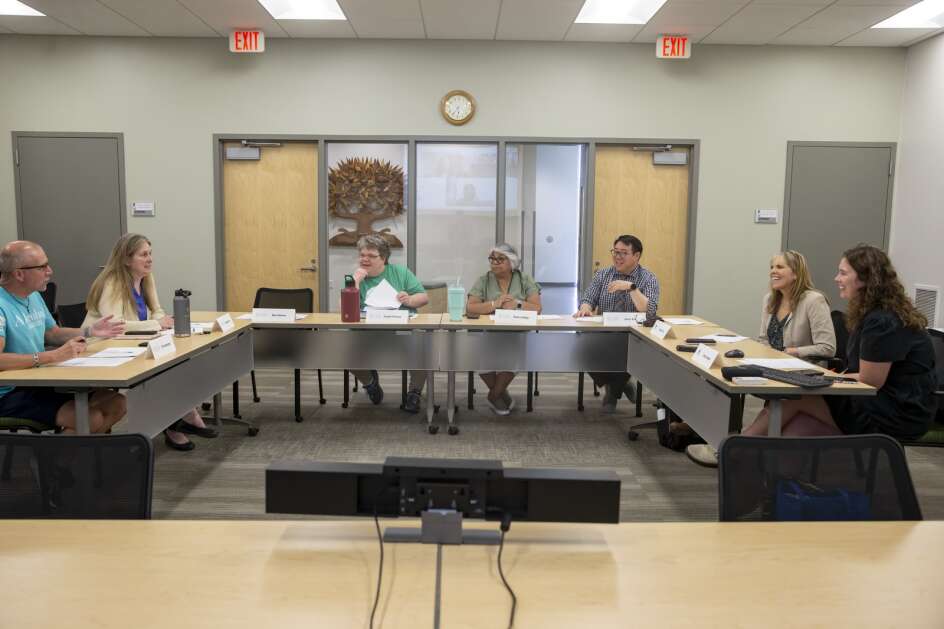The Gazette uses Instaread to provide audio versions of its articles. Some words might not be spoken correctly.
With a new state legislation that bans the majority of citizen review boards, cities around Eastern Iowa are considering how to best encourage openness and community involvement in policing.
Senate File 311 was signed by Governor Kim Reynolds after being passed by Republicans in the Iowa Legislature earlier this year.The statute that goes into effect today forbids towns with civil service commissions from setting up a board or other body to undertake citizen reviews of police officer behavior.
At the time of Reynolds’ signature, these entities were present in at least six Iowa communities: Cedar Rapids, Coralville, Iowa City, University Heights, Dubuque, and Ames.
Cedar Rapids and Coralville have already dissolved their police review boards in accordance with the new law, and Iowa City is scheduled to follow suit at a council meeting next week. There is no civil service commission in University Heights, although the city code still permits its citizen advisory board.
In order to maintain compliance with state law and foster community-police ties, city officials and civic leaders are currently figuring out what to do next.
Cedar Rapids considering Chief s Advisory Board
In a 7-2 decision on Tuesday, the Cedar Rapids City Council disbanded its Citizen Review Board, despite opposition from members Ashley Vanorny and David Maier.
The board was initially established in 2021 with an emphasis on public involvement, assessing citizen complaints, advising the city on department rules and procedures, and participating in the hiring committee for the police chief. It lacked the authority to punish.
This fall, council is anticipated to hear recommendations from officials who have promised to identify a replacement that permits ongoing transparency and citizen input on policing operations.
In order to get community-oriented input on its next moves, city staff are conducting focus groups with local advocacy and nonprofit organizations and conducting interviews with CRB members who are not currently serving.
Community Development Director Jennifer Pratt stated, “We’re going to take those lessons and move those forward. We learned a lot through the creation of the CRB (in 2020 and 2021).” We have observed the advantages of obtaining the input needed to lay the groundwork.
After racial justice activists, led by the NGO Advocates for Social Justice, advocated for more citizen monitoring of local police enforcement in 2020 in the wake of George Floyd’s murder in Minneapolis, the Citizen Review Board was established in 2021.
Suggested Reading
Five years since Floyd protests, what s changed in Eastern Iowa and what s next?
Establishing a Chief’s Advisory Board with members drawn from the entire community is one potential course of action after the CRB is dissolved.
According to Police Chief David Dostal, the group would hold frequent public meetings to address community queries or worries about the policing process, with an emphasis on education.
The department will also keep publishing its monthly data report that details the types of incidents and the number of arrests. Although Dostal stated he is open to possibly publishing those figures more frequently, use of force data is only given once a year.
However, some local activists are already opposing that proposal.
A number of Advocates for Social Justice members who attended the meeting on Tuesday voiced their worries that a Chief’s Advisory Board would not be as independent as the previous CRB structure and would have a detrimental impact on transparency initiatives.
Instead of dissolving the CRB entirely and replacing it with a new organization, ASJ members have urged the city to modify the original CRB activities to comply with state law. They also urged officials to continue their dedication to public safety initiatives and community-oriented policing.
According to ASJ member Mimi Daoud, the atmosphere in 2020 following the murder of George Floyd played a significant role in, if not the primary cause of, the pressure on government leaders and community people to effect change. Community members worry that the momentum we’re aiming for could be lost if there isn’t that sense of urgency.
The recommendations made to City Council members this autumn will incorporate input from the community outreach activities the city is conducting with a number of organizations, including ASJ, in the wake of the dissolution of the CRB.
Iowa City considering listening post meetings with police
A verbal agreement has been reached by the Iowa City Council to dissolve the Citizen’s Police Review Board, which has existed since 1997. The Board was created, in part, to oversee police misconduct investigations locally.
Nevertheless, references to the board are still present in the city’s charter and regulations. Although the Citizen’s Police Review Board has not received any new complaints since July 2, its most recent meeting was held earlier this week.
Although the official board has been disbanded, the police chief, board members, municipal employees, and the city council all believe that a committee of some kind should continue to exist in place of the review board, but they are still at odds about what that committee should look like.
The review board suggested the creation of a committee with a quarterly meeting schedule whose main objective would be to improve community and departmental confidence.
In an email to city council, Melissa Jensen, chair of the Community Police Review Board, wrote, “The board recommends the advisory committee be informal and structured, with efforts led by the chief of police. A wide variety of community representatives with diverse backgrounds and experience would be engaged, and varying staff, external partners, and other representative involvement will help increase the understanding of community issues.”
If the police department takes the lead, several council members are worried about community participation.
“I believe that the fact that the CPRB was operated and supervised by citizens was a significant component of what it accomplished. Oliver Weilein, a council member, stated at a work session that he believes it is somewhat troublesome for the police to lead efforts when individuals are wanting to discuss their experiences with the police.
Weilein continued by suggesting that the city should think about holding meetings where residents can speak with police officers face-to-face and provide additional avenues for citizens to voice their concerns about the department to other city employees or a citizen board.
Dustin Liston, the chief of police for Iowa City, stated that he supported holding casual meetings with the public that would facilitate back-and-forth communication and be centered on community engagement.
We were unable to have a meaningful conversation during the current CPRB meetings. Similar to your formal meetings, when members of the public turn up, they are able to speak with you but you are not able to respond. “And that was frequently frustrating for the CPRB members because some of the public questions had straightforward answers, but we couldn’t talk about it because it wasn’t on the agenda,” Liston told the city council.
The police department, city council, and city employees are still debating potential replacements and intend to do so throughout the fall.
Coralville looking at a community safety committee
Similar to Cedar Rapids, Coralville’s Citizen’s Community Policing Advisory Board was formed in 2020 as a result of discussions about racial fairness in policing with local organizations and residents.
The board’s initial responsibilities included reviewing the police department’s annual data on encounters, reviewing departmental rules, and suggesting departmental training.
A decision to abolish the Coralville City Council’s Citizen’s Community Policing Advisory Board was made in June. Shortly after Reynolds signed the bill into law, the board met for the final time in late April.
To truly examine what’s going on and work together, we’re investigating how to form a committee that can maintain open lines of communication between the Department, the general public, and other organizations. At the June meeting where the board was dissolved, Coralville Mayor Meghann Foster stated, “I think that’s a positive thing, and again, I think we are committed to transparency and accountability, and we will continue to be, with or without a formal review board.”
Building relationships between the police department and the community would be the main goal of the new body, which would take the shape of a community safety committee. The city council has not yet been presented with a formal proposal.
Annual data regarding police contacts is still reviewed by the Coralville City Council; this is something the department did not publish before the advisory board was established.
[email protected] is the commenting email.
Subscribe to the myJohnson County Update newsletter to receive a weekly summary of Johnson County happenings.






